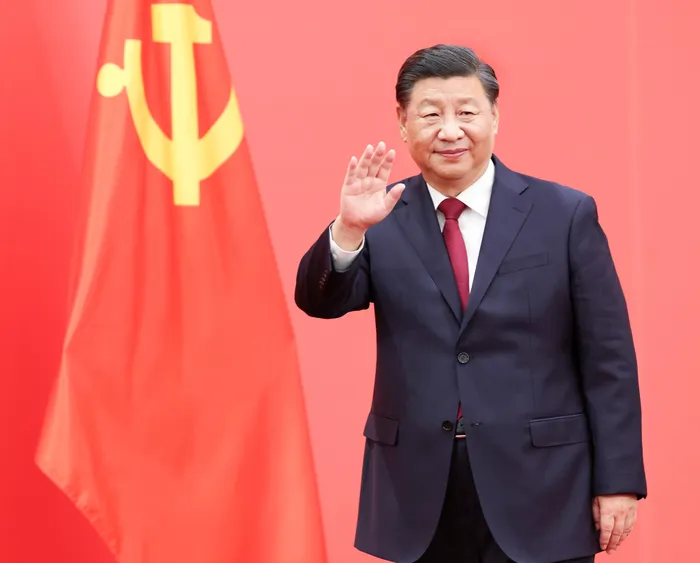
Professor David Monyae's new book, 'Xi Jinping and the Global South', explores a new perspective on international relations and the Global South.
Image: Xinhua
The Chinese embassy and the University of Johannesburg's Centre for Africa-China Studies launched the highly anticipated book Xi Jinping and the Global South at the Pretoria National Botanical Gardens on Tuesday evening.
The event brought together academics, journalists, public members, and government officials, who expressed keen interest to explore the book's fresh perspective on international relations and the Global South.
The book recounts the story of China's engagement with the Global South, covering topics such as the Chinese President Xi Jinping Thought, the Global Civilisation Initiative, China's role in peace and security, and Chinese development initiatives.
Speaking at the event, Professor David Monyae, an author from the Centre for Africa-China Studies, highlighted the significance of understanding the Global South's role in shaping the interconnected world.
Understanding international relations, he said, is crucial for navigating the complex challenges, including conflicts, economic inequality, environmental crises, and rapid technological transformations.
He also highlighted that the global order has historically been dominated by a select few, sidelining the voices and interests of countries in the Global South.
“This structural imbalance has perpetuated inequalities and artificially limited opportunities for meaningful participation in global governance. However, this book reflects the ongoing transformation, where Global South nations are increasingly raising their voices, crafting new narratives, asserting agency, and contributing innovative solutions to global challenges,” Monyae said.
Professor Refilwe Phaswana-Mafuya, deputy vice-chancellor of the University of Johannesburg, praised the book as “timely, relevant, and responsive” to Africa's challenges, particularly in global governance structures.
She remarked that the book highlights Africa's need to transform global governance structures, and collaborate with United Nations (UN) organisations like the World Bank and International Monetary Fund to achieve this goal.
She pointed out that the book highlights the paradox that Africa, despite being a hub of global conflicts, lacks permanent representation at the UN Security Council.
“In my opinion, this book is a call to action. It is a call out of our slumber to really do something to transform our society and our country. As global leaders descend on South Africa for the G20 Summit, they will be very well served by this book. While also working towards the much-needed reforms, they will find this book a valuable resource to consider,” Phaswana-Mafuya said.
Deputy government spokesperson William Baloyi said the book provides an important examination of how President Xi Jinping's ideas and actions affect and resonate with developing countries looking for justice and a role in international governance.
He mentioned that the book will take readers back to the Bandung conference, where China articulated the principle of co-existence, which had underpinned South-South cooperation.
Chinese Ambassador to South Africa, Wu Peng, said the book highlights the Global South as a political identity and collective consciousness, representing “historical actors” striving for a fairer international order.
“We can say that the Global South is no longer the 'silent majority' of the international system. It has already become an important force driving multipolarity, economic globalisation and diversity of civilisations,” Wu said.
Notably, he said, developing economies are outpacing developed ones in terms of growth.
He predicted that global governance is poised to enter a “Global South moment”, where the collective voice and influence of developing countries will shape the future of international relations and cooperation.
“South Africa, Brazil, and Qatar, as hosts, will convene the G20 Summit, the United Nations Climate Change Conference, and the World Summit for Social Development. China firmly supports these Global South countries in hosting these major events, in making the voice of the South heard, in safeguarding the legitimate rights and interests of the South, and in contributing 'Global South solutions' to global Governance,” Wu said.
Monyae’s fascination with China began years ago, sparked by his honours thesis, which compared Malaysia's affirmative action policies with South Africa's own approaches.
His interest in Asia deepened during his Master's research, focusing on the Afro-Asian solidarity movement.
“While this book illuminates China and Xi Jinping’s vision, it is the first among many other relevant Global South subjects and actors who equally need to be explored and analysed to sustain South-South cooperation. India, Russia, and other emerging powers should also be highlighted to show how their leadership and civilisations contribute to global governance and development,” Monyae said.
He highlighted that China's engagement with the Global South differs from Africa's traditional approach, which often focuses on representation and presence in global forums.
According to him, China brings its distinct cultural and intellectual capital to the table, challenging Western-dominated frameworks and offering alternative perspectives on global governance and development.
“This approach embodies the principle that all civilisations are equal, a principle that should guide Africa and other Global South countries in collaboratively shaping development and governance agendas,” he said.
rapula.moatshe@inl.co.za